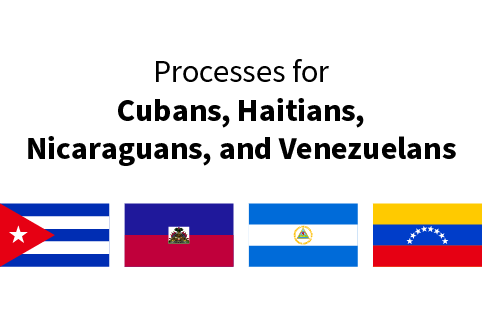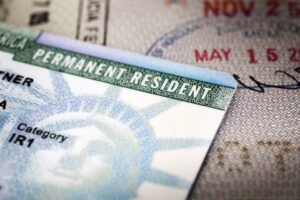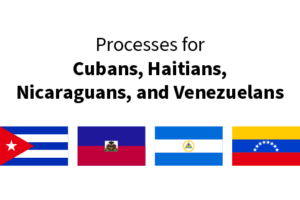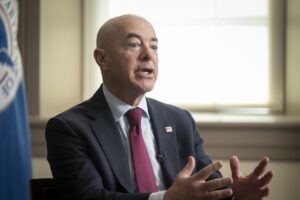DHS has announced processes through which nationals of Cuba, Haiti, Nicaragua, and Venezuela, and their immediate family members, may request to come to the United States in a safe and orderly way. Qualified beneficiaries who are outside the United States and lack U.S. entry documents may be considered, on a case-by-case basis, for advanced authorization to travel and a temporary period of parole for up to two years for urgent humanitarian reasons or significant public benefit. To participate, eligible beneficiaries must:
- Have a supporter in the United States;
- Undergo and clear robust security vetting;
- Meet other eligibility criteria; and
- Warrant a favorable exercise of discretion.
Individuals participating in these processes must have a supporter in the United States who agrees to provide them with financial support for the duration of their parole in the United States. The first step in the process is for the U.S.-based supporter to file a Form I-134A, Online Request to be a Supporter and Declaration of Financial Support, with USCIS for each beneficiary they seek to support, including minor children. The U.S. government will then review the supporter information provided in the Form I-134A to ensure that they are able to financially support the beneficiaries they are agreeing to support.
See below for additional information on the processes and country specific eligibility requirements. Additional information is also available on our Frequently Asked Questions About the Processes for Cubans, Haitians, Nicaraguans, and Venezuelans page.
Eligibility
| Term | Definition |
|---|---|
| Supporter | An individual who holds lawful status in the United States or is a parolee or beneficiary of deferred action or Deferred Enforced Departure (DED) who has passed security and background vetting and demonstrated sufficient financial resources to receive, maintain, and support the individual(s) whom they commit to supporting for the duration of their stay in the United States.
Examples of individuals who meet the supporter requirement include:
Beneficiaries of deferred action (including deferred action for childhood arrivals) or DED. |
| Beneficiary | A national of Cuba, Haiti, Nicaragua, or Venezuela (or their immediate family member of any nationality) who is outside the United States and who may be considered for parole under these processes.
Immediate family members of any nationality in these processes include:
|
Who May be Considered for Advance Travel Authorization
In order to be eligible to request and ultimately be considered for an advance authorization to travel to the United States to seek parole under these processes, beneficiaries must:
- Be outside the United States;
- Be a national of Cuba, Haiti, Nicaragua, or Venezuela; or be an immediate family member (spouse, common-law partner, and/or unmarried child under the age of 21) who is traveling with an eligible Cuban, Haitian, Nicaraguan, or Venezuelan;
- Have a U.S.-based supporter who filed a Form I-134A on their behalf that USCIS has vetted and confirmed;
- Possess an unexpired passport valid for international travel;
- Provide for their own commercial travel to an air U.S. POE and final U.S. destination;
- Undergo and pass required national security and public safety vetting;
- Comply with all additional requirements, including vaccination requirements and other public health guidelines; and
- Demonstrate that a grant of parole is warranted based on significant public benefit or urgent humanitarian reasons, and that a favorable exercise of discretion is otherwise merited.
An individual is ineligible to be considered for parole under these processes if that person is a dual national or permanent resident of, or holds refugee status in, another country, unless DHS operates a similar parole process for the country’s nationals. This requirement does not apply to immediate family members (spouse, common-law partner, or unmarried child under the age of 21) of an eligible national of Cuba, Haiti, Nicaragua, or Venezuela with whom they are traveling.
In addition, a potential beneficiary is ineligible for advance authorization to travel to the United States as well as parole under these processes if that person:
- Fails to pass national security and public safety vetting or is otherwise deemed not to merit a favorable exercise of discretion;
- Has been ordered removed from the United States within the prior five years or is subject to a bar to inadmissibility based on a prior removal order;
- Has crossed irregularly into the United States, between the POEs, after the date the process was announced (for Venezuelans, after Oct. 19, 2022; for Cubans, Haitians, and Nicaraguans, after Jan. 9, 2023), except individuals permitted a single instance of voluntary departure pursuant to INA § 240B, 8 U.S.C. § 1229c or withdrawal of their application for admission pursuant to INA § 235(a)(4), 8 U.S.C. § 1225(a)(4) will remain eligible;
- Has irregularly crossed the Mexican or Panamanian border after the date the process was announced (for Venezuelans, after Oct. 19, 2022; for Cubans, Haitians, and Nicaraguans, after Jan. 9, 2023); or
- Is under 18 and not traveling through this process accompanied by a parent or legal guardian, and as such is a child whom the inspecting officer would determine to be an unaccompanied child.
Important Note about Venezuelan Passports
The beneficiary must have a valid, unexpired passport. Certified extensions of passport validity serve to meet this requirement. If a beneficiary’s passport validity has been extended, the expiration date of the extension should be reflected as the passport expiration date. CBP will not authorize travel if the beneficiary’s passport or extension is expired.
Consistent with the National Assembly decree of May 21, 2019, certain expired Venezuelan passports remain valid. A Venezuelan passport:
- Issued before June 7, 2019 (even if expired before this date), without a passport extension (“prórroga”), is considered valid and unexpired for five years beyond the expiration date printed in the passport.
- Issued before June 7, 2019 (even if expired before this date), with a “prórroga” issued before June 7, 2019, is considered valid and unexpired for five years beyond the expiration date of the “prórroga.”
- Issued before June 7, 2019 (even if expired before this date), with a “prórroga” issued on or after June 7, 2019, is considered valid and unexpired through the expiration date of the “prórroga” or for five years beyond the expiration date printed in the passport, whichever is later.
- Issued on or after June 7, 2019, without a “prórroga” is not considered valid beyond the expiration date printed in the passport.
- Issued on or after June 7, 2019, with a “prórroga” issued on or after June 7, 2019, is considered valid and unexpired through the expiration date of the “prórroga.”





